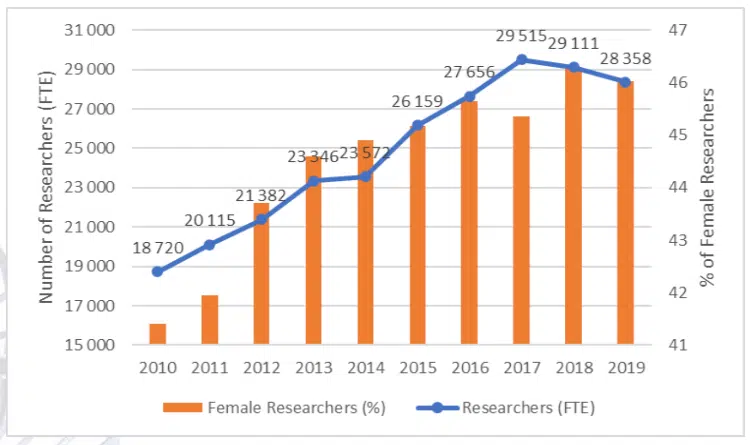
South Africa is facing another skills crisis
South Africa needs to increase the number of researchers and technicians it has at its disposal if it wants to remain globally competitive in innovation.
This was one of the key issues raised in the 2022 South African Science, Technology And Innovation Indicators Report, published by the Department of Higher Education, Science and Innovation on Friday (29 July).
Minister in charge of that department, Blade Nzimande said that the number of researchers employed in research and development (R&D) in South Africa has been on the decline since 2018, as has the number of technicians employed in R&D.
The proportion of technicians to researchers employed in R&D decreased from 32.8% in 2014/15 to 24.3% in 2019/20, and employment in R&D in the business sector declined by slightly more than one-fifth, he said.
“A critical component of a well-functioning innovation system is human capital across all the science, technology and innovation (STI) activities,” the department said.
“Previously, much of the focus was on researchers carrying out R&D activities in South Africa. However, technicians are important for the integration and translation of research ideas into demonstrators and other tangible R&D outputs. Hence, the number of researchers employed in R&D are analysed along with the technicians employed in R&D.”
The department pointed to a steady increase in researchers employed in R&D between 2010 and 2017. However, since 2017, the numbers have declined.
While South Africa’s number of researchers in 2019 (28,358) was 51.5% more than in 2010 (18,720), it said the country needs to up the number of researchers of all races to increase its innovation potential.
South African Researchers in Employment
The upside to the latest data is that transformation is taking place in South Africa’s STI landscape, the department said.
There is an increase in the percentage of African researchers, from 26.7% in 2010 to 35.6% in 2019. However, there is a declining trend among white researchers in the country.
While the percentage of white researchers has declined, the absolute number of white researchers was in fact on the increase from 14,789 in 2010 to 15,795 in 2017. However, the numbers dropped back to 14,890 in 2018 and further to 14,224 in 2019.
The proportion of both coloured and Indian researchers increased marginally between 2010 and 2018, the department said.
Proportion of South African Researchers by Race
When it comes to technicians, a more troubling picture emerges.
The number of technicians employed in R&D has been on the decline since 2015. As a result, the proportion of technicians to researchers has decreased from a high of 32.8% in 2014 to 24.3% in 2019.
“The decline in the percentage and number of technicians employed in R&D should be interpreted in the context of the movement of R&D in South Africa from the business sector to higher education, with more focus on basic research,” the department said.
However, even taking into account the migration from business to academics, the number of technicians employed in R&D by the higher education sector is also very low, it said.
South African Technicians Employed in R&D
Nzimande said that following the 2020 and 2021 Covid-19 pandemic, the country’s National System of Innovation has been “stretched to its limits”, which impacts the country’s ability to compete internationally.
“South Africa’s innovation performance is falling behind other middle-income countries with regard to outputs such as patents and high technology exports. South Africa performs better in innovation inputs than innovation outputs. Considering its level of innovation investment, the country produces few innovation outputs,” he said.
The resolve the issue, he said that his department will focus on the 2019 White Paper on Science, Technology and Innovation, which aims to future-proof education and skills as one of its core pillars.
The government is trying to strengthen a future-ready workforce at both the foundational and further education levels through restructuring curriculae and introducing a broader range of subjects and courses.
Read: Major skills shortage looms for schools in South Africa






